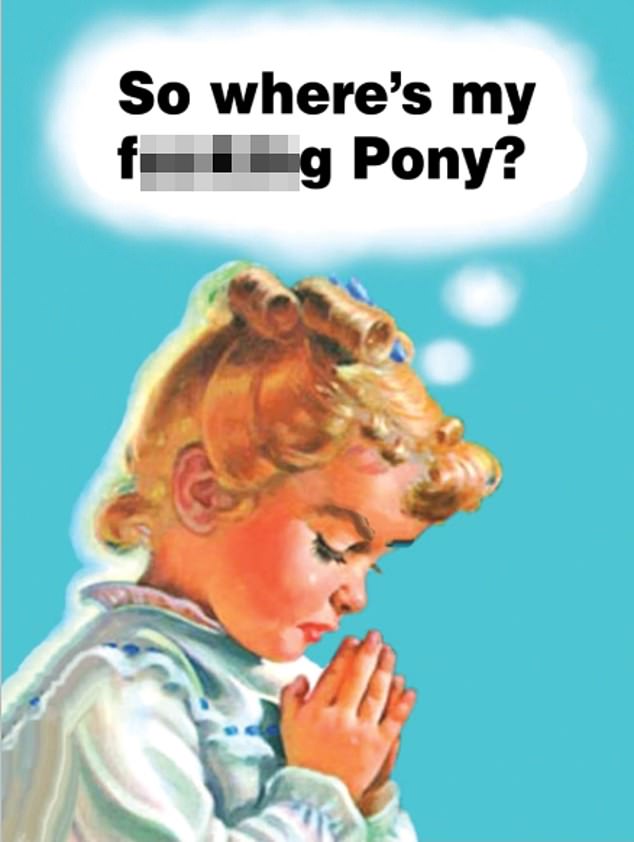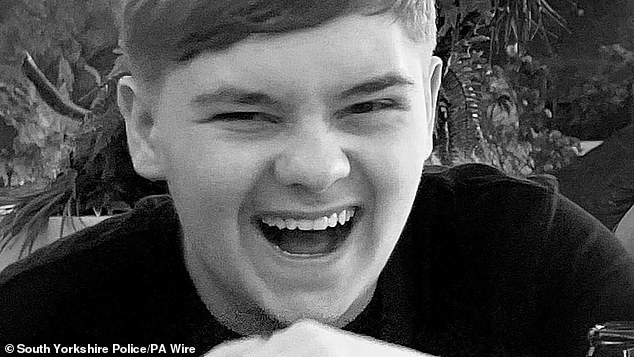A few years ago I received a borderline-blasphemous birthday card, which I have to admit made me chuckle. It showed a sweet little birthday girl of about five, dressed in pink, kneeling in prayer by her bed, with a thought bubble emerging from her head reading: ‘So where’s my f****** pony?’
I thought of that card this week when I heard Kemi Badenoch’s explanation of why she had ‘rejected God’.
In an interview with the BBC, the Tory leader said that in her youth, when she was still a believer: ‘I was praying for all sorts of stupid things and I was getting my prayers answered.’
But although she remains a ‘cultural Christian’, she lost her faith in God in 2008 when she read the horrific story of Elisabeth Fritzl – the Austrian woman whose depraved father imprisoned her in a cellar and repeatedly raped her for 24 years.
Said Mrs Badenoch: ‘I was praying to have good grades, that my hair should grow longer, and I would pray for the bus to come on time so I wouldn’t miss something. It was like, why were those prayers answered and not this woman’s prayers? And it just, it was like someone blew out a candle.’
Now, I have a lot of time for Mrs Badenoch. It’s true, as her many critics are quick to point out, that she is not a star performer at the Despatch Box in the Commons. Not yet, anyway.
But her heart seems to be squarely in the right place. Indeed, she talks a great deal of sense on a wide range of subjects – from the threat to our national cohesion posed by mass, unrestricted immigration to the need for young, snowflake Britons to show more ‘resilience’ and self-reliance.
However, God’s 24-year failure to answer Elisabeth Fritzl’s desperate prayers strikes me as a strange and frankly preposterous reason for the Tory leader to have turned atheist.

In an interview with the BBC, Kemi Badenoch told how she lost her faith as a young girl

The Tory leader cited Josef Fritzl, who imprisoned his daughter Elisabeth Fritzl in a cellar and repeatedly raped her for 24 years, as the reason she lost faith in God
When she read this horrific story, after all, she was already 28 years old. Surely, this granddaughter of a Methodist minister must have learned by that age that God, if He exists, has always permitted all sorts of unspeakable things to happen, in His mysterious way, no matter how fervently the faithful may pray that they won’t.
Why did one woman’s appalling suffering blow out Mrs Badenoch’s candle when the Holocaust, Hiroshima and Nagasaki or centuries of the industrial slaughter of innocent, prayerful Christians in warfare and natural disasters had apparently failed to do so? At the very least, doesn’t it suggest that her faith burned less than brightly in the first place?
I should say at once that as an agnostic lapsed Catholic, who tries very hard to believe in God but finds it extremely difficult, I am in absolutely no position to preach to anyone about the consolation of prayer or the importance of going to church.
Though brought up by a staunch Anglican father and a devout Catholic mother (why, by the way, are Protestants always ‘staunch’ and Catholics always ‘devout’?), I gave up going to Mass regularly in the early 1970s. This was soon after I started at Westminster School, which was then – and perhaps remains – a breeding-ground of cynicism and scepticism, despite its insistence on its pupils’ attendance at daily prayers in the Abbey.
I can’t claim that my reasons for turning my back on the Almighty were any more respectable or profound than Mrs Badenoch’s. On the contrary, I was motivated mostly by sheer laziness and my love of a Sunday morning lie-in.
It didn’t help, either, when I heard that one of the priests who used to hear my confession every week had been defrocked, for reasons rumoured to involve sexual impropriety – in his case, you may be surprised to hear, with an adult woman!
I disliked the idea that I had confided my sins to this man, now a layman who might no longer feel bound to take my secrets of the confessional with him to his grave. Never mind, I hasten to say, that these never amounted to anything more interesting or specific than telling the occasional whopper, showing disrespect for a teacher, being spiteful to a sibling or forgetting to say my prayers ‘many times’.
Laziness and that feeling of being cheated aside, however, I also found it increasingly difficult to accept all the things I was supposed to believe as a Catholic – that Jesus was the son of God, born of a virgin, that he rose from the dead after being crucified for our sins and that, one day, we will all face divine judgment and have to live with it, like it or not, for the rest of time.

‘I thought of that card this week when I heard Kemi Badenoch ’s explanation of why she had “rejected God”,’ says Tom Utley
One thing I’ve never lost, however, is my envy (there’s another sin) of true believers like my parents, my three siblings and my wife – constant churchgoers and prayer-sayers every one of them.
I saw the comfort Christianity gave my late father in the serene resignation with which he accepted as the will of God his total blindness from the age of nine. I saw it in my late mother’s fearlessness on her deathbed, which sprang from her trust in the Almighty’s mercy and her belief that death was a beginning, not an end.
I see it in the way Mrs U looks forward eagerly to Sunday Mass as the highlight of her week and her passionate opposition to abortion (which I happen to share). Funnily enough, though she was a cradle Catholic like me, she was no more religious than I when we married in 1980.
Perhaps it was exasperation with her irritating husband that drove her back into the arms of Mother Church? Whatever the truth, she seems to find happiness there.
As for me, I’ve never ‘rejected God’, as Mrs Badenoch said she did when Elisabeth Fritzl’s ordeal ‘killed’ her faith. Indeed, as I progress through my eighth decade on this planet, when so many of my contemporaries die, I find myself increasingly longing to feel the tug on Father Brown’s ‘invisible thread’ that will bring me back to the church and give true meaning to human life and death.
Meanwhile, I warmly welcome the recent evidence of a quiet revival of regular Christian worship, not only among my own 65-plus age group but among Britons aged 18 to 24, of whom 16 per cent tell a survey for Bible Society that they went to church at least once a month last year – up from only four per cent as recently as 2018.
For one thing on which the self-described cultural Christian Mrs Badenoch and I can surely agree wholeheartedly: this would be a happier and safer country if more of its citizens believed firmly in the Christian values on which it was built. I’m thinking of consideration for others, respect for property and the law, compassion for those in genuine need and abhorrence of violent crime.
But will I discover for myself, before it’s too late, the unquestioning faith that gives so much strength and comfort to true believers? Oh well, I suppose I can always pray.












